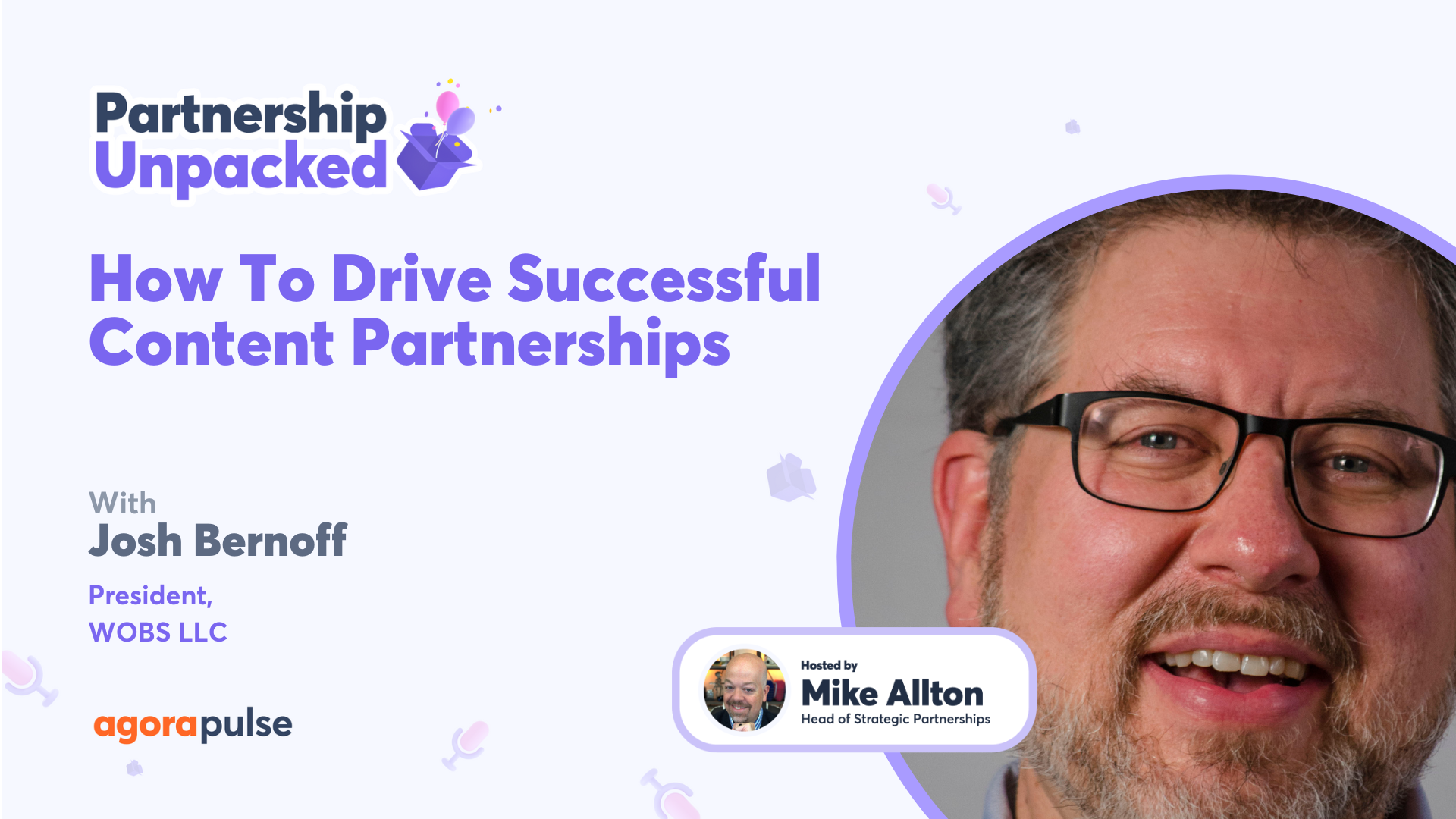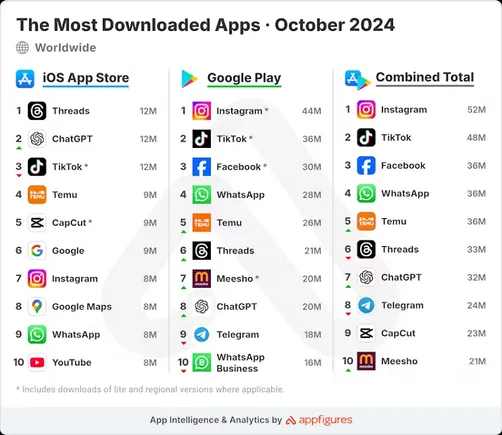One of the keys to successful partnerships is the creation of great content.
You might not always equate partnerships with content, but the fact is, the partnership space is filled with content-filled satellites such as onboarding, case studies, pitches, white papers, reports, sales introductions, books, and of course the more obvious rockets such as blog posts, eBooks and webinars.
Each one an opportunity to partner with a colleague within your organization, or a partnership leader from another brand.
How can we ensure these content partnerships succeed?
That’s what we’re covering in today’s episode of Partnership Unpacked.
Welcome back to Partnership Unpacked, where I selfishly use this time to pick the brains of experts at strategic partnerships, channel programs, affiliates, influencer marketing, and relationship building… oh, and you get to learn too! Subscribe to learn how you can amplify your growth strategy – with a solid takeaway every episode from partnership experts in the industry.
Now for years I’ve been a huge fan of collaborative content like round-up blog posts, interviews like this one, and live videos with guests. These are always great ways to create valuable content and reach new audiences.
These are also terrific ways to start new brand partnerships. But just because you’re getting someone else involved in creating content, doesn’t mean it’s going to automatically be successful.
How can we make sure our content partnerships achieve our goals?
That’s exactly what Josh Bernoff is going to talk to us about.
Josh is a prolific writer and is dedicated to helping other businesses and authors publish amazing content. Books he has written or collaborated on have generated over $20 million for their authors. Josh’s daily blog at Bernoff.com has topped 4 million views. He was formerly senior vice president, idea development at Forrester Research, where he spent 20 years analyzing technology and business.
Partnership Unpacked host Mike Allton will ask Josh Bernoff on Date at Time:
♉️How brands can leverage content partnerships
♉️Where to start to ensure a successful partnership
♉️What pitfalls to avoid with content partnerships
Subscribe to the show calendar: agorapulse.com/calendar
Learn more about Josh Bernoff
Resources & Brands mentioned in this episode
Full Notes & Transcript:
(Lightly edited)
Mike Allton: One of the keys to successful partnerships is the creation of great content. You might not always equate partnerships with content, but the fact is, partnership space is filled with content filled satellites such as onboarding, case studies, pitches, white papers, reports, sales, introductions, books, and of course, The more obvious rockets, such as blog posts, eBooks, and webinars, each one, an opportunity to partner with a colleague within your organization or a partnership leader for another brand.
But how can we ensure these content partnerships succeed? That’s what we’re covering in today’s episode of Partnership Unpacked. This
is Partnership Unpacked, your go to guide to growing your business through partnerships quickly. I’m your host, Mike Alton. Each episode unpacks the winning strategies and latest trends from influencer marketing. To brand partnerships and ideas that you can apply your own business to grow exponentially.
And now the rest of today’s episode.
Welcome back to partnership unpacked where I selfishly use the sign to pick the brains of experts at strategic partnerships, channel programs, affiliates, influencer marketing, relationship building. Oh, and you get to learn to subscribe to learn how you can amplify your growth strategy with a solid takeaway.
Every episode from partnership experts in the industry. Now for years, I’ve been a huge fan of collaborative content, like roundup, blog posts, interviews like this one and live videos with guests. These are always great ways to create valuable content and reach new audiences. These are also terrific ways to start new brand partnerships, but just because you’re getting someone else involved in creating content.
Doesn’t mean it’s going to automatically be successful. How can we make sure our content partnerships achieve our goals? That’s exactly what Josh is going to talk to us about. Josh is a prolific writer and is dedicated to helping other businesses and authors publish amazing content. Books he has written or collaborated on have generated over 20 million dollars for their authors and Josh’s daily blog at Bernoff.
com has tapped 4 million views. He was formerly Senior Vice President, Idea Development at Forrester Research, where he spent 20 years analyzing technology and business. Hey, Josh, welcome to the show.
Josh Bernoff: Hey, it’s great to be here and great to connect with you.
Mike Allton: Yeah, absolutely. We were talking before the show.
We’ve known each other. We’ve been connected for many, many years. I could not even tell at what point we were connected, but this is our first time having a chance to actually talk, so I’m excited for this.
Josh Bernoff: Well, uh, you know, as you and I are members of the original social media mafia from 2007, 2008. So yeah, we’ve been kicking around the same circles for quite a while.
Mike Allton: Right, right. Now, first content partnerships that could encompass a great many different kinds of mediums and arrangements. What does that mean or even look like to you?
Josh Bernoff: Well, I work mostly with, uh, people who are interested in long form content, uh, for example, books. And so. Uh, people think of books as a solitary activity.
You, you see the book and it says, buy so and so on the cover, but every book is a collaboration tends to be a collaboration of ghost writers, editors, coauthors, um. Uh, and then of course, you end up working with, uh, with various people on the publishing side. And I’ve become really well attuned to what it takes to make those partnerships successful.
And this kind of things that can go wrong. If you really start off on the wrong foot or don’t have the right communication.
Mike Allton: That’s so true that you mentioned, you know, editors and publishers and all the other people that come into creating a book. I’ve got a published book. I had four. Co authors. So even though I know how horrifying experience.
Yeah, right. You know, but I, I still wouldn’t have thought about it until you said it, that every book is a collaboration, even if it’s a single author. Uh, so that’s, that’s such a great point. And a lot of our. Teams are creating content today with its blog posts and that sort of thing. You’re still generally not working on an island.
You have other folks, graphic designers and so on that you’re collaborating with and you’re creating those partnerships.
Josh Bernoff: Yeah. I, uh, it was sort of a joke there, but, uh, one of my rules is that, uh, two authors is a challenge. But you can be successful if you plan it right. Three or more authors is a disaster.
So, that’s, first, if people want to write down the first rule, it’s uh, two co authors is the right number, more than two is a, is a really big struggle. Three
Mike Allton: or more is a disaster. What is five?
Josh Bernoff: Well, you know, it sort of depends. If you, if you divide things up and you’re like, you write the first piece and I’ll write the second piece and so on, I guess it could work, but then you have questions of, is it consistent?
In the typical co authoring arrangement, uh, even if one author is writing a chapter, the other one’s generally reviewing it. So I can’t imagine how that would work with five people. I mean, I don’t really want four people commenting on and editing the stuff I’m doing.
Mike Allton: Yeah. And you’re, and you’re right.
That, that was the exact challenge we thought going into it. Oh, there’s five of us and we’re, it was a book on social media marketing, right? So we divided it up into logical ways based on each person’s strengths and expertise. And, and so going into the project that made. Absolute sense. That’s fantastic.
Mike can write about LinkedIn and influencer marketing and Jen can write up an Instagram and so on. But then to your point, halfway through realizing every one of these chapters sounds very different, right? And there’s not a lot of cohesiveness. So the editing became. A challenge, right?
Josh Bernoff: Yeah, it’s it’s actually a good example of a principle.
I think that applies not just to co authoring arrangements or editing, but to any, uh, any partnership, which is, uh, you want to reduce. The amount of work by having multiple people contribute not increase it And I see this all the time where someone’s like, oh you and I should write a book together we should we should be co authors and then each author is Checking the work of the other author and you know your you end up Basically writing the entire book, even though there are two of you and the other person ends up writing the entire book and it just, you’re not actually more efficient and that, that communications overhead and that planning of process is what it takes to allow a partnership to be more than the sum of its parts, as opposed to just, just an enormous waste of, of.
A duplicated effort,
Mike Allton: right? So that’s a great segue to my next question, because whether we’re colleagues at the same company or partners, different brands or even co authoring and we decide, like you said, Hey, let’s do this thing together. What’s a good first step towards that kind of content partnership?
Josh Bernoff: So I think in the beginning. The planning is essential when I work with somebody else on a major piece of content, whether, uh, I’m the editor and they’re the author or whether we’re both coauthors or I’m a ghostwriter and they’re the client, the beginning portion. is an intensive investigation of what is the idea, who’s the audience, what problem are we trying to solve, how will we differentiate this versus the other people who’ve tried to do this, this question, um, and, uh, and what’s the table contents, right?
What are, what is, what are the various pieces that we’re going to create? And unless you have. A solid agreement on that. And that typically takes multiple hours of meetings to, to hassle out. Unless you’ve got a solid agreement on that, then you’re starting immediately with a different perspective than the other people.
And of course it’s going to go off the rails. Now it’s necessary, but not sufficient. Once you have, uh, have that common agreement, you can still get into trouble, but at least you’ll be starting from the same starting point and heading off in approximately the same direction.
Mike Allton: It sounds like you’re almost starting a new business.
Josh Bernoff: It’s interesting. Um, I actually am conceiving a new business right now with somebody else. And, and it is remarkable how much of the process is, has got some of those similarities. Right.
Mike Allton: Who are we talking to? Has this been done before? You know, what, what are the, uh, the comparables on the market today? And what are we solving for?
Where’s that gap? Let’s, it doesn’t exist.
Josh Bernoff: Let’s not forget whose name goes at the top and whose name goes second on the cover.
Mike Allton: Don’t even get me started on that.
Josh Bernoff: Oh, always. Oh, you know, that’s one of those little things that you get to the end. And you’re like, no, I thought I was going to be the one who was the first author listed.
When you go in the bookstore, do you look it up under your name or the other person’s name? That’s. You know, just one of those little things you’d like to get straight.
Mike Allton: Yeah. On Amazon, my book is still only listed by the first of the coauthors. So yeah, that’s a, that’s a sore point for me. Thanks for bringing that up, Josh.
So how do you determine upfront if one of these potential partners, whether it’s a coauthor, a colleague is good, uh, or maybe a lousy potential partner? Are there any red flags that we could look for?
Josh Bernoff: Um, Yeah, lying is a red flag, right? You said this and then you did this other thing. Um, I, I think everybody goes in with preconceptions and it’s a good idea to get those out on the table because those are the kind of things that when you discover them later, it’s like, uh, you know, oh.
You would actually murder someone for failing to use the Oxford comma. Maybe we need to be a little bit more careful about our partners. Um, I, one of my principles is that these partnerships should be asymmetric. So let’s just say I’m a great writer and my coauthor is a great writer and, uh, I am. Bad at conducting interviews.
And my coauthor is also bad at conducting interviews. Well, then we’re going to be duplicating our efforts. We’re going to be second guessing each other, and we’re also going to have holes in what we do. And the best partnerships I’ve seen are the ones where people have complimentary skills. So I’ll just cite here this, this book, uh, groundswell that, that, uh, I coauthored with Charlene Lee, uh, first book I wrote, which was quite successful.
Um, we divided things up and while Charlene is a, is a good writer, we sort of agreed that the writing would mostly be my responsibility. On the other hand, the ideas and the concepts there were mostly her responsibility. So it was a case of our. Discussing concepts for a chapter. Getting a clear plan for where we were going, then I would go off and do the research and writing on most of the chapters.
She did some, um, and then she would review it and we’d make sure that we were on the right track. And I think that worked because, because we had a clear idea of who had which responsibilities. Uh, and. That, that sort of question of what are you good at and what’s the other person good at is essential to get straight when you’re going to work on a collaborative project.
Mike Allton: That’s such a great point to go back to our earlier analogy of starting a whole new business. One of the things that a lot of people. Typically do when they’re starting a new businesses is a SWOT analysis. And it sounds like you can do that same approach for each of you in this partnership. What are my strengths?
What are my weaknesses? What are your strengths? What are your weaknesses? And make sure that there’s a good division of labor that complements each other’s strengths and
Josh Bernoff: weaknesses. Right. Yes, the, the other thing I’d say is essential is to think about process. So, uh, whether you’re writing a book chapter or doing a, uh, a podcast interview or, uh, writing a video or whatever, um, You are going to start with a conceptualizing and planning stage, right?
So that’s, that’s the first thing that’s probably done collaboratively, although it might be one person does it and the other person reviews it. Then there’s a creation. Stage in which you’re drafting something. Um, and then the question is, what is the review process? Uh, how, how does the other person review it?
Uh, how do you react to their reviews? How do you end up discussing which pieces need to get changed in, uh, whether it’s a major fail or, or just. You know, sort of minor corrections. I mean, I’m doing this right now. I’m ghostwriting a book for the CEO of an organization, and there are three other people involved.
And, uh, we do the planning up front. I, I create what I call a fat outline, which is basically like a spec for what’s gonna be in the chapter and in what order. They review that and then I, I do the whole thing. Um, and they review that. And, uh, then we discuss not only what the comments are, but, you know, did I get the tone wrong?
Um, are there certain things that they don’t want? In this case, I was told that I cannot use the word liar. And I’m like, okay, now I know I’m not going to use the word liar. Cause it’s going to appear with your name on it. Uh, and so that sort of definition of process. Was set up up front clearly and we are executing on that and if it hadn’t been for that, then people wouldn’t have an idea of what they were supposed to do and, you know, then you end up doing more and more and more work than you would if it was just you by yourself.
Mike Allton: That makes a lot of sense. I particularly related to the part where you said, decide how you’re going to react to the reviews. I know when I got my chapters back. fully redlined and edited by entrepreneur presses editor. I did not react well. I was not prepared for that process. I could have been better prepared in advance, particularly with their help.
This is not the first book they’ve ever published. Um, but yeah, going into these kinds of situations with other brand partners, we might be sitting down and working together for the very first time on, on a piece of content, you know, an ebook or something like that. Um, and, and you’re right. Having these Conversations in advance will help smooth the way so much better when we’re thinking about wanting to do something like this.
Are there ways that you found success in actually finding great partners, whether it’s a co author or someone who’s going to contribute in other ways to the project?
Josh Bernoff: Hmm. That’s an interesting question. Uh, I, I have an extensive network. And so if the question is, who is a, a good writer on the topic of artificial intelligence, I can probably go and, and suggest somebody, or at least call somebody and get a suggestion about who might be able to do that.
If somebody’s, I mean, like if, if, uh, I’ve, I’ve been in this situation where, uh, Someone I was pretty good friends with asked me to edit their book and I’m like, this is fiction. I don’t edit fiction. I don’t know anything about fiction. So let me find you a fiction editor because that’s not, that’s, you’re not going to be happy with the result if I end up doing that.
Um, so I, and I, I, this doesn’t sound very. Scientific, but I really do think that this is a network thing. Um, the more people you know, the more variety of people you know, the better off you are. And you can not only tap people you know, but you can tap into that network and find other people. Um, um, I’ll mention here that I am…
A member of a nonfiction writers group happens to be on Facebook and we’re always asking questions like this and other people are chiming and someone’s, do you know anybody who can do highly technical illustrations? And someone’s like, oh, that came up in my book and here, this person can do that. So to be involved in that kind of online community where there’s a lot of trust is often very helpful in extending your network.
To find the right talent
Mike Allton: for this show. That’s the perfect answer. You know, look to your network and be in communities where you can reach out and allow other people to bring their network to you. Love it. What would you say has been your most successful partnership today? Well, it’s a book or something else.
Josh Bernoff: I Interesting question. Definitely that first book that I did with Charlene Lee is the most successful partnered piece that I have ever participated in. That book sold 150, 000 copies and both Charlene and I have built careers off of it. Her as, as an expert on all kinds of technology trends and disruption and so on.
And me as an expert on, on writing and books. Um, but I, I’m just thinking about other examples. I. Let me, let me draw a contrast for you here, which I think is illustrative. Um, I found myself in 2018, just because of the way the timing worked, ghostwriting two books. And if people look my name up on… On Amazon, you will find the two books because they both say by author’s name with Josh Bernoff on them.
Uh, in one case, the authors and I worked out everything in a great deal of detail ahead of time. I was basically writing to a series of chapters that they had already mapped out. They had already done some interviews. I did other ones and then I would submit. A draft and they would look at it and say, Oh, this is wrong.
And that’s in the wrong order. And you got the emphasis wrong here and, and so on. And it was an extremely, uh, uh, organic and collaborative process. And I was thrilled by that because I love. Constructive criticism. I love it when people say, no, no, this is wrong. I’m like, oh, how can we solve the problem and make this person happy?
The, the second book that I was writing at the same time, I would have these conversations with the, uh, the author CEO is working with, and then I’d go off and have to do everything myself. The ideas, the, the research, the, you know, the interviews, conceiving everything, I would check things and, and then I’d, I’d write a chapter and then I’d turn it in and the feedback I typically got was good.
I was like, I was like, yeah, okay. And I’m, I’m very pleased with the result of that collaboration, but it didn’t have quite the same dynamic to it. And so that, you know, I, the first is an example of what I’d call a successful collaboration, even though there was a lot of back and forth and things changed and frustration, but.
The result got us to a good place. The second one, even though the result was pretty good, I just, as a collaborative effort, it, it fell short a little bit.
Mike Allton: It’s so fascinating. We’re talking about content partnerships and how you can work with brand partners, colleagues, and so on to leverage content as a channel for your business. Real quick, I want to share with you a message from our CMO at Agorapulse, Darryl Praill, about another channel you might not be utilizing sufficiently.
Darryl Praill: It’s the Arc de Triomphe. Can you imagine if you’re in charge, if you’re the CMO of marketing Paris, what are your main channels? Wow, there’s The Arc de Triomphe, there’s the Eiffel Tower, there’s the Louvre. Those are your channels you’re going to use to drive tourism dollars in. Okay, now, but you’re not the CMO of Paris.
In fact, you’re the CMO of your company, product, service. So what are your main channels? Well, I’m going to guess they’re things like pay per click, maybe trade shows events, maybe content. Those are all pretty predictable, right? Let me ask you this question. Are you treating social media as a main channel?
By the way, only 1. 8 percent of you today measure social media and can prove an ROI in that investment. HubSpot and Gartner say social media is the number one channel to invest in this year. Are you doing it? If not, I can tell you why. You’re not doing it because you don’t have the tools, you don’t have the mentality.
And that’s okay. We’ve got you covered. You change the mentality, we’ll give you the tools. AgoraPulse Tracks all the R. O. I for you. One place to manage all your social media activity. Your number one channel. Change your success. Treat social media as a channel. One CMO to another. My name is Darryl. I’m with AgoraPulse. I’ll talk to you soon.
Mike Allton: So Josh, one of the things that we touched on a moment ago that I wanna dig into a little bit further was when you’ve got partners, colleagues, co-authors working on this project together. Uh, hopefully we’ve already done some analysis in terms of strengths and weaknesses and we. Making sure that those are complimentary or asynchronous, as you said.
But when it comes to dividing the work, should that be equal time commitments? Should it be based on this kind of expertise and tasks or something else? How do you ensure that it’s fair?
Josh Bernoff: Fair. It’s never fair. Come on. Okay. What you really want to do is to make sure that it works. So, uh, for example, If you have two partners and one of them has got an enormous amount of experience and the other one doesn’t, uh, and the one with all the experience is putting in one quarter of the hours is the other one.
Are we going to divide up? The, uh, the compensation equally. No, the more experienced person’s time is worth more and they’re going to get compensated that way. And as long as that’s set up upfront, that’s fine. Um, I do think that you want to make sure that people are contributing in ways that make sense.
So for example, if somebody works with me as an editor, um, uh, I, if, if they hire me as an editor, my job is to tell them where the weaknesses are in there, What they have created and how they can best improve that. Uh, and. That’s, that’s appropriate if they then come to me and say, I want you to help produce some, uh, conceptual graphics.
I’m like, no, no, that’s, I’m terrible at that. Okay. If you ask me to do that, the first thing I do is to find somebody who’s good at it and hire them. So, uh. It really is a question of where the talent’s applied and it’s never going to be equal. I mean, I just, just to give you an example, okay, I’m, uh, when you get to the end of one of these writing projects, you hire a copy editor and their job is to find those last few errors, you know, grammatical errors, spelling errors, inconsistencies, things of that kind.
Well, they’re not going to get. Put in the same amount of time and get compensated in the same way as the people who created it. And that’s an essential role. That doesn’t mean that they’re an equal contributor. Wow. Everybody should be equal. Now, this is, this is not a communist society here. Contribute according to what.
To what they’re able to contribute and they get compensated according to the level of contribution that they make.
Mike Allton: I love that point. And it is very different from a lot of the other partnership type projects that we might work on with the brands where the expectation is it’s going to be a balanced outcome.
Put it that way, right? Where if it’s compensation, it’s shared. If it’s leads, it’s shared and that sort of thing. But this is creating content like this is different. Everyone has different roles to play. And while they’re all important, that input is valued a little bit differently. Now, you’ve been doing this for a while.
You’ve got a lot of experience, obviously, in collaborating with other people who are not sitting next to you in an office. What specific tools are you using or recommending that can help us stay on top of these kinds of content partnerships and actually maybe even collaborate on the content itself?
Josh Bernoff: Interesting question. So, um, first of all, uh, when the pandemic hit, I had already before that been using zoom frequently. And when the pandemic hit, I sort of, that became my main way of interacting with people. Um, and you have to get good at that, right? There are, there are things that you can do in a collaborative meeting where you share content or, or, uh, use a chat window, for example, that are, that are very effective.
But I’ll tell you, it’s interesting. I, I recently, I kicked off the ghostwriting project I had mentioned earlier, and I also just earlier this week met with, uh, two, uh, very senior people who are interested in writing a book and we did some conceptual planning. And there is no substitute for face to face meeting with people to just get things started and get everybody understanding who.
Who is who? So it’s not all zoom. It’s that’s that’s not the best thing at the very beginning of a project. Now, the other thing I will mention is, um, you know, I am not a, uh, slack user. For example, I mostly use email for communication in terms of of collaboration on. Text content. Um, I’m, I’m moved back and forth between Word and Google Docs.
Google Docs is effective for people who, uh, for when you have multiple people commenting on the same document. Um, and I know that it’s possible to do that with Microsoft, but it’s much easier with Google. Um, so when I’m collaborating with multiple people, that’s, that works well. On the other hand, Microsoft Word works best when you’re like, Lobbing stuff back and forth here.
Take a look at this. Okay, here’s my review. Okay, here’s two and so on. The last thing, and I probably should have mentioned this first is I’m a total nut about, uh, uh, Google sheets that to plan everything. So if you’re working on a book project, you list out all of the, the, um, Chapters and then you write the question that each chapter will answer and then you write the case studies that will be in each chapter and you, you, as you work on it, you put the page, the word count so you can keep track of how many words are coming and that becomes a project planning tool, but very lightweight and simple and easy to use.
I use another sheet in this, in the same thing for keeping track of interviews. Which ones have I scheduled? Who haven’t I scheduled yet? Which ones have I completed? Uh, and so, uh, for me, that sort of project management using a shared spreadsheet, you, a Google sheet is, is extremely effective and really helpful when it comes to working with other people in a partnership, because everybody can see what’s.
what’s done, what hasn’t been done, and who has to do what.
Mike Allton: I couldn’t agree with that more. I love Google Sheets. I use them for my big quarterly virtual events, which often have multiple partners involved in that, and collaborators, and colleagues. And I even use it for this show, for the podcast. You know, as a guest, you filled out a Google Form, and I use the Google Form because the results go into Google Sheet, which I can copy and paste that row into my brain, as I call it, which is my planning sheet for this entire show.
Everything that’s coming up.
Josh Bernoff: I just want to mention this. I mean, I’ve worked with some other people who use some very sophisticated tools like, uh, um, they use. Airtable or Notion or Coda. I mean, some of these things are fairly very, very sophisticated in their ability to keep track of stuff. But the advantage that Google Sheets has is that everybody knows how to use it.
So, so unless everybody in your shop is using these same tools, you might as well go back to something that has. 90 percent of the capability and 100 percent of the usability.
Mike Allton: Yeah, I couldn’t agree more. We use Asana here at Agorapulse internally for all of our major projects. I can’t think of a single instance where I have used it with an external partner to manage that project because unless we have a whole conversation about it, I don’t know if they’re using Asana.
I don’t know their comfort level with Asana. I don’t want to force them to try to use a tool that they’ve never used because that’s just going to be a roadblock in the entire partnership arrangement.
Josh Bernoff: Yeah. I, I recently got involved in a project where the, uh, one of the collaborators is an 80 year old woman.
And I’m like, can I use Google docs? And they’re like, well, she’s not that good, but the other 99 percent of the population, you don’t have to worry about it.
Mike Allton: Yeah. Yeah. Awesome. Josh, I’ve got just one more question for you and it is my favorite question. I asked this of every guest, how have relationships helped you in your career?
Josh Bernoff: What a fascinating question. So I, I’m going to give you a really honest answer. Which is probably going to get me blackballed from the world forever. So, um, I was an incredible talent when I started in, in the working world, I had been trained as a mathematician. I was in the PhD program at MIT. So I was really sophisticated with that.
And I thought I was a really good writer. Um, and I was, let’s just face it. I was arrogant. Okay. Which is. Pretty good for somebody who’s never really worked in business. Um, and certainly in the, in the time that I spent in startup companies, and then in the 20 years that I spent at Forrester research, arrogance is sort of a default in many cases for the technology analyst who’s supposed to know everything about everything.
Um, and, uh, if, if you don’t mind my putting it this way, I was a little bit of an a hole I really, really, really, I think. Annoyed the heck out of people, um, because of that attitude. Now, when I left to go independent, which is about eight years now, eight years ago now, um, I found a few things. One was that I had an enormous network of people that I had collaborated with, uh, worked with, worked under, worked for, uh, And I also found that when it was necessary to work with a client, I had to do a lot better at listening because clients have no patience for people who are like, Oh, I’m smarter than you.
Well, I’m sorry, that doesn’t work very well. Um, and I, I, I, so I’ve kicked some of those, those arrogant. Attitudes to the curb, and I’m much better at listening. And what I find now is that my network, especially the people who I did collaborative work with in the past, people who I worked on, uh, research reports or software products or, or books or whatever, those people that I worked with.
Because of the fact that we were, we were building something great together, I can go to them and ask for anything. Um, and, and that’s, that’s really one of the most valuable things. One of my, one of my really most valuable contacts right now is a woman who, my relationship with her started with me writing a research report about what were the weaknesses in her product.
But, but, but what I learned is that people respect hard workers and they respect integrity. And as long as you’re sort of an honest operator and not behaving like an ass, those relationships can grow. And man, I would not be anywhere if I hadn’t built up all of those relationships that I had over those decades as an analyst and as a startup found a startup.
Mike Allton: Fantastic answer. Thank you for sharing that. And you had me a little worried when you started, but you brought it home, which is fantastic. And it’s just revealed this truth. And one of the reasons why I asked this question of all my guests is because relationships are key to successful relationships.
Partnerships and some people in this space don’t yet see that they don’t understand it. So I’m reinforcing that with every single episode, every guest comes in, they get the same question. They all answer a little bit differently, which is fascinating to listen to often. They tell stories just like you did about people who have made a difference in their lives as a result of having that relationship.
But the end result is the same. Relationships are everything. So thank you for sharing that. And thank you for being here, Josh. This has been a fantastic interview. I hope people go back and, and relisten to some of those key points and imagine how their upcoming co authored content, whatever that looks like is going to work better, thanks to your advice for people who’ve got more questions, or they want to learn more about you or pick up some of your books, where can they go to find you and learn more?
Josh Bernoff: Okay. Well, uh, the center of everything about me is that my, uh, website at Bernoff.com. I publish a new blog post every weekday and have been since 2015. So that’s a lot of content there. Um, my latest book is build a better business book. And if you’re going to be, be working on or collaborating on a business book in a corporate environment or as an individual, that’s really a resource that’s got everything that you need.
So I hope people will take a look at that and they can find out more about that at Bernoff. com slash books
Mike Allton: Fantastic, and we’ll have all those links and more in the show notes and that’s all we’ve got for today friends Thank you for listening. Please if you’ve liked this episode drop us a review on apple podcast and let me know what you thought We’d love to hear from you.
See you next time.
Thank you for listening to another episode of partnership unpacked hosted by Mike Alton and powered by Agorapulse, the number one rated social media management solution, which you can learn more about at agorapulse. com. If you enjoyed this episode, please subscribe on your favorite podcast player. Be sure to leave us a review.
Your feedback is important to us. And if you
want to be part of our audience during live broadcasts, take a look at our calendar at agorapulse. com forward slash calendar until next time.











